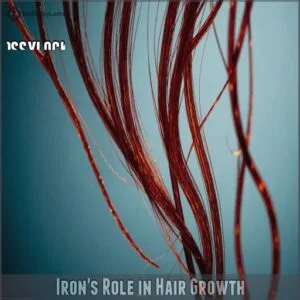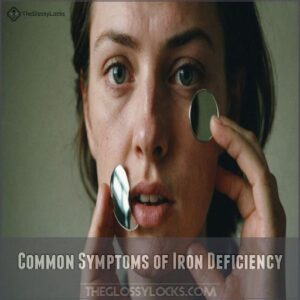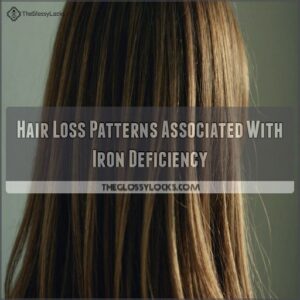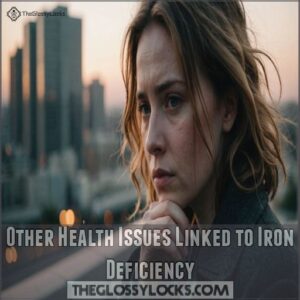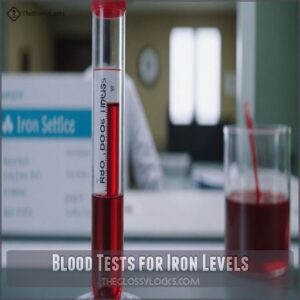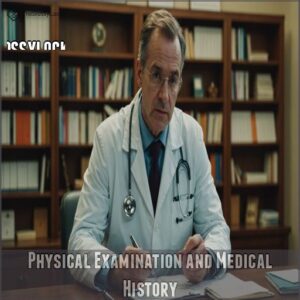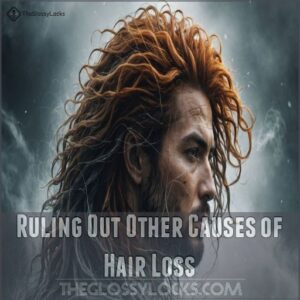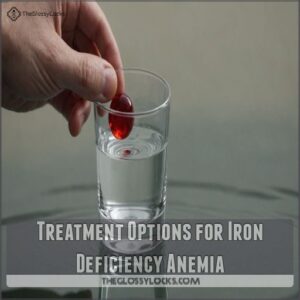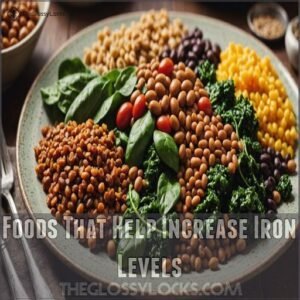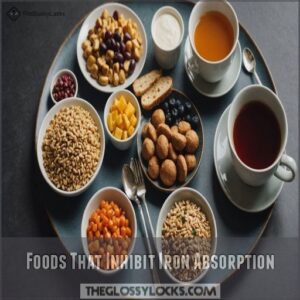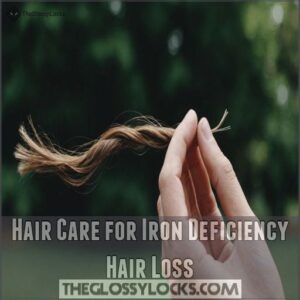This site is supported by our readers. We may earn a commission, at no cost to you, if you purchase through links.
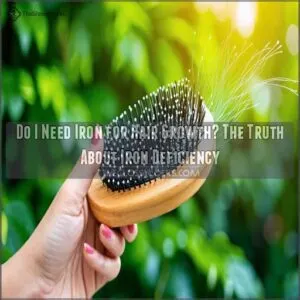 Yes, you need iron for healthy hair growth.
Yes, you need iron for healthy hair growth.
Your body uses iron to create hemoglobin, which carries oxygen to your hair follicles.
Without enough iron, your follicles can’t function properly, leading to hair loss and thinning.
If you’re noticing more hair in your brush lately, iron deficiency might be the culprit.
Women, vegetarians, and endurance athletes are particularly at risk.
The good news? You can boost your iron levels through diet and supplements.
Your hair’s health is closely tied to your iron intake, and understanding this connection is key to maintaining those luscious locks you’re aiming for.
Table Of Contents
- Key Takeaways
- Iron’s Role in Hair Growth
- Symptoms of Iron Deficiency and Hair Loss
- Diagnosing Iron Deficiency Anemia
- Treatment Options for Iron Deficiency Anemia
- Foods That Help Increase Iron Levels
- Foods That Inhibit Iron Absorption
- Hair Care for Iron Deficiency Hair Loss
- Frequently Asked Questions (FAQs)
- Can iron pills help with hair growth?
- Why is iron important for hair growth?
- Should I take iron supplements if I have hair loss?
- How much iron should I take a day for hair growth?
- Is iron necessary for hair growth?
- Can hair grow without iron?
- How much iron should I take for hair growth?
- Can iron test for hair loss?
- How long until hair grows after fixing iron deficiency?
- Can iron supplements cause excessive hair growth elsewhere?
- Does cooking in cast iron help with absorption?
- Are liquid iron supplements better than pills?
- Can too much iron make hair fall out?
- Conclusion
Key Takeaways
- You do need iron for healthy hair growth as it’s essential for creating hemoglobin, which carries oxygen to your hair follicles.
- Iron deficiency can lead to hair loss, thinning, and slower growth, with women, vegetarians, and endurance athletes being particularly at risk.
- You can boost your iron levels through diet changes (like eating more red meat and leafy greens) and supplements, but always consult a doctor before starting any new regimen.
- While addressing iron deficiency can improve hair health, it typically takes 3-6 months to see noticeable improvements in hair growth.
Iron’s Role in Hair Growth
Iron is essential for maintaining a healthy scalp and preventing hair breakage, which is a common issue that can be addressed with quality hair growth products. Iron plays a vital role in hair growth by supporting the production of hemoglobin, which carries oxygen to hair follicles.
Your body needs adequate iron levels to maintain healthy hair growth and prevent hair loss associated with iron deficiency anemia.
How Iron Affects Hair Follicles
Iron plays a key role in your hair’s health and growth.
At the heart of hair follicles, iron helps create hemoglobin, which carries oxygen to cells.
This oxygen fuels the growth cycle of your hair.
While infant conditions like cradle cap causes and hair loss can be concerning, hair growth issues more often stem from deficiencies in nutrients like iron. Without enough iron, your follicles can’t function well, leading to slower growth or even hair loss.
Think of iron as the fuel that keeps your hair’s engine running smoothly.
Relationship Between Iron and Hair Loss
You might be wondering about the link between iron and your luscious locks.
Well, there’s a connection, but it’s not as straightforward as you’d think.
Here’s what you need to know:
- Low iron can disrupt your hair growth cycle
- It might cause more hair to enter the shedding phase
- Iron deficiency can weaken hair follicles
- Addressing iron issues may improve hair health
But remember, hair loss is complex, and iron’s just one piece of the puzzle.
Impact of Iron Deficiency on Hair Growth
The impact of iron deficiency on hair growth can be significant.
When your body lacks iron, it prioritizes essential functions over hair growth.
This can lead to a condition called telogen effluvium, where hair follicles prematurely enter the resting phase.
Just like men want to be providers and take care of their partners, as shown in the male provider instinct, our bodies also work to maintain balance and prioritize key functions.
As a result, you might notice increased shedding and thinning.
Addressing iron deficiency through supplements or dietary changes, which can be helped by quitting or reducing alcohol consumption as excessive drinking can lead to nutritional deficiencies, may help promote healthier hair growth and overall well-being.
Symptoms of Iron Deficiency and Hair Loss
Iron deficiency can lead to various symptoms, including hair loss in some individuals.
You might notice thinning hair or increased shedding, along with other signs such as fatigue, pale skin, and brittle nails.
Common Symptoms of Iron Deficiency
Feeling like you’re running on empty? Iron deficiency can sneak up on you, draining your energy and leaving its mark.
You might notice fatigue creeping in, your skin looking paler than usual, or finding yourself short of breath after climbing stairs.
Don’t brush off brittle nails or a sore tongue – these could be your body’s way of waving a red flag.
Iron’s essential for keeping you going strong.
Hair Loss Patterns Associated With Iron Deficiency
Iron plays a crucial role in the anagen phase, hair growth cycle stages, particularly in the rapid cell division process that promotes hair growth. Iron-deficiency anemia disrupt your hair’s natural growth cycle, leading to noticeable changes.
You might experience:
- Diffuse thinning across the scalp
- Increased shedding during brushing or washing
- Slower regrowth of lost hairs
These patterns often resemble telogen effluvium, where more hairs than usual enter the resting phase.
If you’re noticing these signs, it’s worth checking your iron levels.
Remember, hair loss can have multiple causes, so consult a doctor for proper diagnosis.
Other Health Issues Linked to Iron Deficiency
Beyond hair loss, iron deficiency can wreak havoc on your body.
You might feel like you’re running on empty, with fatigue hitting you like a ton of bricks.
Your nails could become as brittle as old china, while your skin turns pale as a ghost.
Catching your breath might feel like you’ve just run a marathon, and your tongue could become sore and inflamed.
These symptoms aren’t just annoying—they’re your body’s cry for help.
Diagnosing Iron Deficiency Anemia
You’ll need a thorough evaluation to diagnose iron deficiency anemia, which includes blood tests, a physical exam, and a review of your medical history.
Your doctor will also consider other potential causes of hair loss, such as the effects of DHT production and the effectiveness of treatments like Minoxidil vs Finasteride, to make sure an accurate diagnosis and appropriate treatment plan are made.
Blood Tests for Iron Levels
To diagnose iron deficiency, your doctor will order blood tests to check your iron levels.
These tests measure several key markers, including hemoglobin, ferritin, and total iron-binding capacity.
Iron deficiency can lead to a condition called telogen effluvium, where hair follicles are damaged, causing widespread thinning of the hair in both men and women.
It’s a simple process – just a quick blood draw.
The results will show if you’re low on iron, which could be contributing to your hair loss.
Don’t worry, it’s a common and treatable condition.
Physical Examination and Medical History
During your doctor’s visit, they’ll review your family history and ask about your lifestyle, including diet and exercise habits.
The physical exam checks for common signs of iron deficiency – they’ll look at your skin’s color, check your nails for brittleness, and examine your tongue for soreness.
Your doctor will also note any medications you’re taking and discuss previous treatments you’ve tried.
Ruling Out Other Causes of Hair Loss
Hair loss detectives need to rule out several suspects before pinpointing iron deficiency as the culprit.
Your doctor will start by checking your iron levels, possibly recommending an iron deficiency test.
They’ll also check for hormonal imbalances, thyroid issues, and stress-related factors that might be causing your thinning locks.
They’ll also examine potential scalp conditions, such as those caused by hormonal imbalances and hair growth disruptions, and review your medications, since certain medications can cause hair loss as a side effect.
Treatment Options for Iron Deficiency Anemia
If you’ve been diagnosed with iron deficiency anemia, you’ll need a thorough treatment approach that includes both supplements and dietary changes.
Your doctor can create a personalized plan that may include iron supplements, iron-rich foods, and strategies to address the underlying causes of your deficiency.
Iron Supplements and Dosage
When your doctor diagnoses iron deficiency, you’ll typically start with an 18mg daily supplement providing 100% of recommended values.
It’s important to take iron supplements exactly as prescribed, since too much can be harmful.
While side effects like constipation are common, taking supplements with vitamin C can help absorption.
Remember to space out your doses from coffee or calcium, which can interfere with absorption.
Dietary Changes to Increase Iron Intake
Iron supplements work best when paired with smart food choices.
You’ll want to boost your iron intake through diet to support both supplements and hair growth.
Here are four iron-boosting changes to make today:
- Add lean red meat twice weekly
- Include dark leafy greens at every meal
- Choose iron-fortified cereals for breakfast
- Pair iron-rich foods with vitamin C sources like citrus fruits
Be consistent with these changes, and you’ll help maximize your iron levels naturally.
Addressing Underlying Causes of Iron Deficiency
Beyond dietary factors, you’ll need to tackle the root causes of iron deficiency with your doctor, as hormonal imbalances can also contribute to low iron levels and subsequent hair loss.
Medical conditions like heavy menstrual cycles or gastrointestinal issues often lurk behind low iron levels.
Your healthcare provider can help identify these underlying problems through blood tests and physical exams.
Once identified, they’ll create a treatment plan specifically designed for your needs that addresses both your iron deficiency and its source.
Foods That Help Increase Iron Levels
You’ll find plenty of iron-rich foods that can support healthy hair growth in your local grocery store.
When you’re struggling with iron deficiency, eating the right foods along with proper absorption techniques can make a significant difference in your iron levels.
Iron-Rich Foods and Portion Sizes
Now that you know iron supplements can help, let’s look at what’s on your plate.
Red meat packs a powerful punch – just 4 ounces twice weekly meets your needs.
For a meatless route, grab a cup of cooked lentils or two cups of spinach.
Fortified cereals offer an easy breakfast boost, while oysters and mussels serve up impressive iron portions in just 3 ounces.
Vitamin C-Rich Foods to Enhance Iron Absorption
Your body absorbs iron better when you pair it with vitamin C-rich foods.
Think of vitamin C as iron’s wingman – it helps your body make the most of every iron-rich bite you take.
Here’s what to reach for:
- Fresh oranges or a glass of orange juice with your iron-fortified breakfast
- Bell peppers added to your spinach salad
- Strawberries alongside your iron supplement
- Tomatoes mixed into your lentil dish
Meal Planning for Optimal Iron Intake
Planning iron-rich meals doesn’t have to feel like rocket science.
Start your day with iron-fortified cereal and orange juice for vitamin C, which boosts absorption.
For lunch, pair leafy greens with lean meat or beans, and add bell peppers for extra vitamin C.
At dinner, combine red meat or fish with steamed broccoli, avoiding coffee or tea which can block iron absorption.
Foods That Inhibit Iron Absorption
While you’re working hard to boost your iron levels for healthy hair growth, certain foods can secretly work against your efforts by blocking iron absorption.
You’ll want to know about these common iron blockers and how to time your meals properly, so you can maximize the benefits of your iron-rich diet.
Common Foods That Interfere With Iron Absorption
Certain foods can block iron absorption, even when you’re eating well.
Coffee and tea contain tannins that bind to iron, while dairy products‘ calcium can interfere with absorption.
Whole grains and legumes contain phytates, while spinach and other leafy greens have oxalates – both compounds that limit iron uptake.
Knowing these interactions helps you make smarter choices about when to eat iron-rich foods.
Maintaining a balanced diet is also essential for survival, and learning about food preservation techniques, such as canning food tips, can help guarantee access to nutrient-rich foods.
Strategies to Minimize Inhibition
Now that you know which foods block iron absorption, let’s look at smart ways to maximize your iron intake.
Space iron-rich meals at least two hours from coffee or tea breaks.
When taking supplements, avoid them with breakfast or during meals containing whole grains.
Instead, take iron supplements on an empty stomach or before bed, unless your doctor advises otherwise.
Foods That Can Help Counteract Inhibition
While you’re taking steps to avoid iron blockers, you can actively boost iron absorption with vitamin C-rich foods.
Similar to how berries and citrus fruits promote hair growth by maintaining collagen levels for strong hair what are the diet for hair growth, pairing your iron-rich meals with oranges, strawberries, or bell peppers can maximize absorption.
Having a glass of orange juice with your morning eggs or adding lemon to your spinach salad can help your body make the most of dietary iron.
Hair Care for Iron Deficiency Hair Loss
Taking care of your hair during iron deficiency requires a gentle, strategic approach that supports both your strands and overall health.
Managing iron deficiency hair loss isn’t just about supplements – it’s about creating a thorough care routine that protects your existing hair while supporting new growth.
Here are three essential steps for hair care during iron deficiency:
- Use sulfate-free shampoos and avoid harsh chemicals that can further weaken fragile strands
- Minimize heat styling and tight hairstyles that could cause additional stress to your hair
- Choose protein-rich conditioning treatments to strengthen hair fibers
Remember to be patient with your hair regrowth journey.
While you’re working on increasing your iron levels through diet and supplements (under medical supervision), focus on preventing further damage.
Consider protective styles that don’t pull on your roots, and trim split ends regularly to maintain healthy-looking hair.
Frequently Asked Questions (FAQs)
Can iron pills help with hair growth?
Like a knight’s rusty armor, iron pills alone won’t guarantee hair growth.
They’ll only help if you’re iron deficient – get your levels tested first.
For best results, combine supplements with a balanced diet.
Why is iron important for hair growth?
Iron helps your body produce hemoglobin, which carries oxygen to your hair follicles. Without enough iron, your follicles can’t grow healthy hair, leading to thinning and potential hair loss.
Should I take iron supplements if I have hair loss?
Women with low iron levels (below 20 ng/ml) have a 30% higher chance of hair loss.
Don’t start supplements without consulting your doctor first – you’ll need testing to confirm if iron deficiency’s causing your hair loss.
How much iron should I take a day for hair growth?
You’ll need about 18mg of iron daily if you’re a woman aged 19-50, or 8mg if you’re over
Always check with your doctor before starting supplements, as too much iron can be harmful.
Is iron necessary for hair growth?
Just as a garden needs nutrients to flourish, your hair depends on iron for healthy growth.
It’s essential for carrying oxygen to your follicles, and without enough iron, you might experience thinning or loss.
Can hair grow without iron?
Hair needs iron to grow properly – it’s essential for delivering oxygen to your follicles.
While hair can technically grow without sufficient iron levels, you’ll likely experience thinner, weaker growth and potential hair loss.
How much iron should I take for hair growth?
Like a building needs its foundation, your body needs iron.
Women aged 19-50 need 18mg daily, while those over 50 need 8mg.
Always consult your doctor before starting supplements, as excess iron can be harmful.
Can iron test for hair loss?
An iron test can’t directly diagnose hair loss, but it can reveal iron deficiency, which may contribute to shedding.
If you’re worried about thinning locks, your doctor might recommend a blood test to check your iron levels.
How long until hair grows after fixing iron deficiency?
Patience is key, like waiting for a garden to bloom.
You’ll typically see hair growth improvement within 3-6 months after fixing your iron deficiency.
Keep nourishing your body, and you’ll soon reap the rewards of healthier locks.
Can iron supplements cause excessive hair growth elsewhere?
Iron supplements typically don’t cause excessive hair growth elsewhere on your body.
They’re mainly used to treat deficiencies.
While they can help with hair loss on your scalp, they won’t turn you into a werewolf overnight!
Does cooking in cast iron help with absorption?
Yes, cooking in cast iron can boost your iron intake.
The acidic foods you prepare release small amounts of iron from the pan, which you then absorb.
It’s a simple, tasty way to up your iron game.
Are liquid iron supplements better than pills?
Picture a fast-flowing stream versus a gentle trickle.
Liquid iron supplements often absorb faster than pills, but they’re not necessarily better.
Your body’s unique needs and your doctor’s advice should guide your choice.
Both forms can be effective.
Can too much iron make hair fall out?
While iron is essential for hair health, excessive intake can be harmful.
You might experience hair loss if your body’s iron levels are too high.
It’s a delicate balance – think of it like Goldilocks finding the "just right" amount.
Conclusion
Who knew your hair was such an iron fanatic?
Turns out, you really do need iron for hair growth.
If you’re shedding more than your cat, it might be time to beef up your iron intake.
Remember, iron deficiency can be sneaky, so keep an eye out for symptoms and don’t hesitate to get your levels checked.
Whether through diet tweaks or supplements, giving your body the iron it craves can help you maintain that glorious mane.
So go ahead, embrace your inner iron chef for healthier, happier hair.

